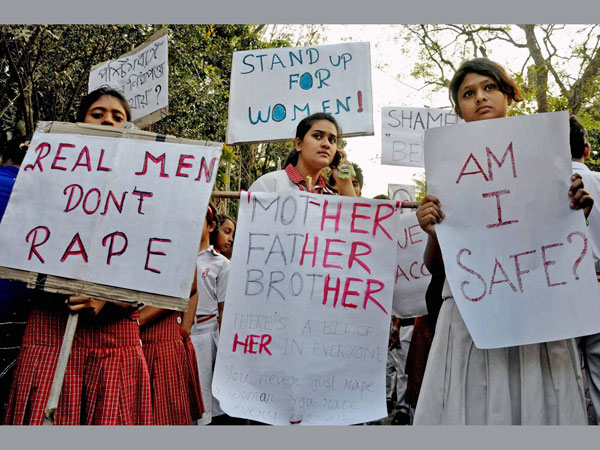
Why Kerala rape issue's media coverage is shocking
The brutal rape and murder of Jisha at Perumbavoor in Kerala has turned out to be the 'hottest' topic in poll-bound Kerala. Parties are busy in mud-slinging. Even the prime minister of the country, Narendra Modi, is scheduled to meet the shocked mother of the deceased woman in hospital.
Assembly Polls Coverage 2016; Parties using Jisha rape & murder to win Kerala polls
The compulsion of the politicians are understandable although it will be interesting to see whether they remain equally bothered about the gruesome death that came to light quite late after the election of May 16 gets over.

How is the country's national media seeing the Jisha story?
But we are not concerned about the politicians' 'genuine' concern. Our question is for those who claim to hate the 'dirty politics' and hold the political leaders for every second mess that is found in the country---the media.
Why was Jisha straightaway named in public when Jyoti's identity was kept secret?
Once the gruesome story of Jisha came to the open, she was tagged as "Kerala's Nirbhaya" on lines of Jyoti Singh Pandey who faced a similar experience in a cold night in December 2012 in New Delhi. But then, we all saw the woman in Kerala being named in the public. If we had thought out such a honourable name for Jyoti, why was no protective gear suggested for Jisha apart from that temporary tag of "Nirbhaya of Kerala"? That not only shows the media's hypocrisy but also the lack of respect it had for the poor woman in the southern state. Section 228A of the IPC clearly makes this act punishable but how many are caring?
A Brahmin rape victim's honour more valuable than a Dalit's?
Why was Jisha named openly when Jyoti was not (till her mother said last year that she had no shames naming her lost daughter)? Was it because our elite media thought the honour of a Brahmin (Jyoti) was more valuable to protect than that of a Dalit (Jisha)? This approach exposes our narrow mindset and expecting respect for women from such a mental set-up is perhaps too much. Dear PM, your appeal to respect women is bound to fall on deaf ears.
Why was Jisha's photos published at liberty?
The media even had no qualms in publishing/releasing photographs of Jisha while we doubt if a single photograph of Jyoti has come out in the public domain today. In Kolkata, a rape victim Suzette Jordan defied all odds to come out and gave her identity, something which was appreciated in all quarters. But nobody cared to give Jisha's identity a protection. Is it because she had a weak social identity? This is a question that not just the media but we, as an entire society, need to answer to.
Why little coverage for Jisha unlike Jyoti in 2012?
The hypocrisy in the mainstream media's coverage is also staggering. Around the time after Jyoti's gangrape in a moving bus, the entire country was shaken, so much so that even the then Manmohan Singh government had to inititate legal reforms to ensure that those who commit crime against women are dealt with more sternly.
Even the gruesome rape and murder of a student in Bengal went largely unnoticed
The Capital was so stirred that many still believe that it was one of the final nails on the declining UPA II's coffin and marked the end of Sheila Dikshit's 15-year-rule in Delhi the following year. Jisha's death is also getting a lot of coverage in the local news channels but how many national channels have taken up this issue as a duty to address the deteriorating safety conditions of women in the country?
A few years ago, a student was brutally gangraped and murdered in West Bengal and the state's chief minister, Mamata Banerjee, was even found dubbing the protesters as supporters of the Opposition.
Social status, geography important for the media to respond to a crime against humanity?
Yet, not many national channels had taken up the issue despite the magnitude of the crime and the CM politicising the killing of an innocent girl. So as like the position in the social hierarchy, the geographical location also determines the media's response to a grave offence like rape and murder?
Why say a "Dalit woman raped"? What has rape to do with the social status?
We also ask why it is being said in Jisha's case that a Dalit woman has been raped and murdered? Is the identity of a Dalit so very important to make one understand the seriousness of a rape? We thought it's a crime against humanity and not a social group. Given the sharp political polarisation we have in our country now, mentioning the term Dalit perhaps helps both the pro-saffron and anti-saffron parts of the society politically to which the 'liberal/illiberal' media caters.
Both the pro-saffron and anti-saffron media has a hidden agenda in this
For the former, reminding the Dalit identity is important for it will give the saffron leaders a chance to attack the 'secular' forces of Kerala on the point that they have done little for the oppressed classes. For the later, a mention of Dalit will convey that 'acche din' (good days) are here for the well-offs and upper castes. 'No matter how much he reveres Ambedkar ahead of the UP polls, the Dalits have no place in Modi's india' is the inherent message.
It is a shocking truth that the unscruplous media is setting the agenda for its own commercial success and to appease the respective powers behind. Souls like Jisha are just petty pawns in this big dirty game.


 Click it and Unblock the Notifications
Click it and Unblock the Notifications


































